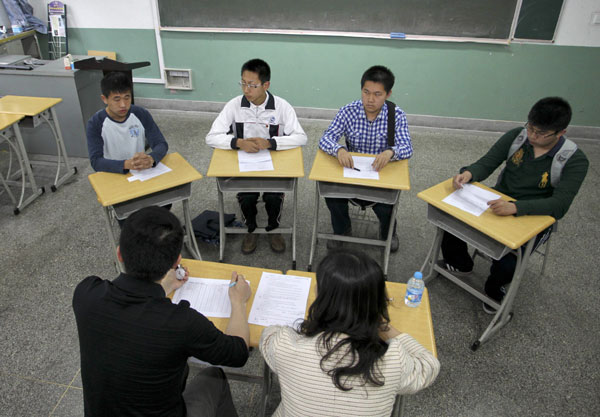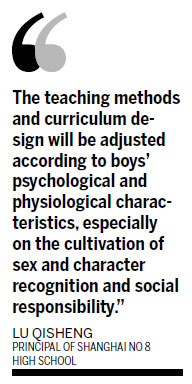Parents 'wait and see' on all-boys classes
Updated: 2012-05-21 07:51
By Wang Hongyi in Shanghai (China Daily)
|
||||||||
Applications far outnumber places available for new program
Most parents are taking a wait-and-see attitude about the boys-only experimental classes at a high school in Shanghai, which has just finished its application period.
The first boys-only campus in the city, an experimental program between the Huangpu district education bureau and East China Normal University, is an effort to solve the "boys crisis" in academic performance and cultivate masculinity. The boys-only experimental classes will open this fall.
According to the school, 272 male students have applied for 60 places in the two classes.
 |
|
Candidates for two boys-only experimental classes at Shanghai No 8 High School are interviewed on Saturday. The first boys-only campus in the city will open this fall. Zhang Dong / for China Daily |
"The number of applications was not inconsiderable and there is some competition for entering the classes," said Lu Qisheng, principal of Shanghai No 8 High School.
"Some parents are more open-minded about the boys-only classes, and they would like to send their children to study here, where hopefully they can better develop boys' advantages," Lu told China Daily on Friday.

"In the first round of interviews, we found these boys are very bright and vivacious. They have a wide range of knowledge, which is beyond textbooks," Lu said. The final name list will be announced at the end of the month.
Lu admitted that most parents are taking a wait-and-see attitude toward the single-sex program.
"Many parents have come and asked questions about the school, but they didn't make a decision. It's quite understandable. After all, boys-only classes are still new to most parents in the country," Lu said.
The poor performance of boys in schools has long been discussed by educators and sociologists, who have hotly debated how to provide an appropriate education to boys.
Wang Ronghua, director of the Shanghai Education Development Foundation, has previously claimed that the underrepresentation of boys in schools and in colleges will have a negative impact on the country's scientific and technological innovation.
He has also advised giving male students gender-specific education while simultaneously lowering the bar for them to enter college.
Lu noted that the boys-only classes will have different priorities than co-ed classes, with little regard for rote memorization, which boys are not good at.
"The teaching methods and curriculum design will be adjusted according to boys' psychological and physiological characteristics, especially on the cultivation of sex and character recognition and social responsibility.
"We will choose teachers who are versed in interacting with boys and better developing boys' potential," he said.
Even so, still many parents resolutely oppose the program and worry that a single-sex environment will affect their children's ability to communicate with the opposite sex.
"Just keeping boys away from girls cannot solve the boys crisis. Actually, it may cause other problems," said a woman named Zhu Yuzhen.
"Boys can grow well in a more comprehensive environment, which, I think, is more important."
Wen Jun, head of the Institute of Sociology of the Shanghai-based East China Normal University, said that adopting appropriate educational methods for boys is more effective than just sending children to single-sex classes.
"Children should learn to deal with different people and things," he said.
Contact the writers at wanghongyi@chinadaily.com.cn

 Relief reaches isolated village
Relief reaches isolated village
 Rainfall poses new threats to quake-hit region
Rainfall poses new threats to quake-hit region
 Funerals begin for Boston bombing victims
Funerals begin for Boston bombing victims
 Quake takeaway from China's Air Force
Quake takeaway from China's Air Force
 Obama celebrates young inventors at science fair
Obama celebrates young inventors at science fair
 Earth Day marked around the world
Earth Day marked around the world
 Volunteer team helping students find sense of normalcy
Volunteer team helping students find sense of normalcy
 Ethnic groups quick to join rescue efforts
Ethnic groups quick to join rescue efforts
Most Viewed
Editor's Picks

|

|

|

|

|

|
Today's Top News
Health new priority for quake zone
Xi meets US top military officer
Japan's boats driven out of Diaoyu
China mulls online shopping legislation
Bird flu death toll rises to 22
Putin appoints new ambassador to China
Japanese ships blocked from Diaoyu Islands
Inspired by Guan, more Chinese pick up golf
US Weekly

|

|






